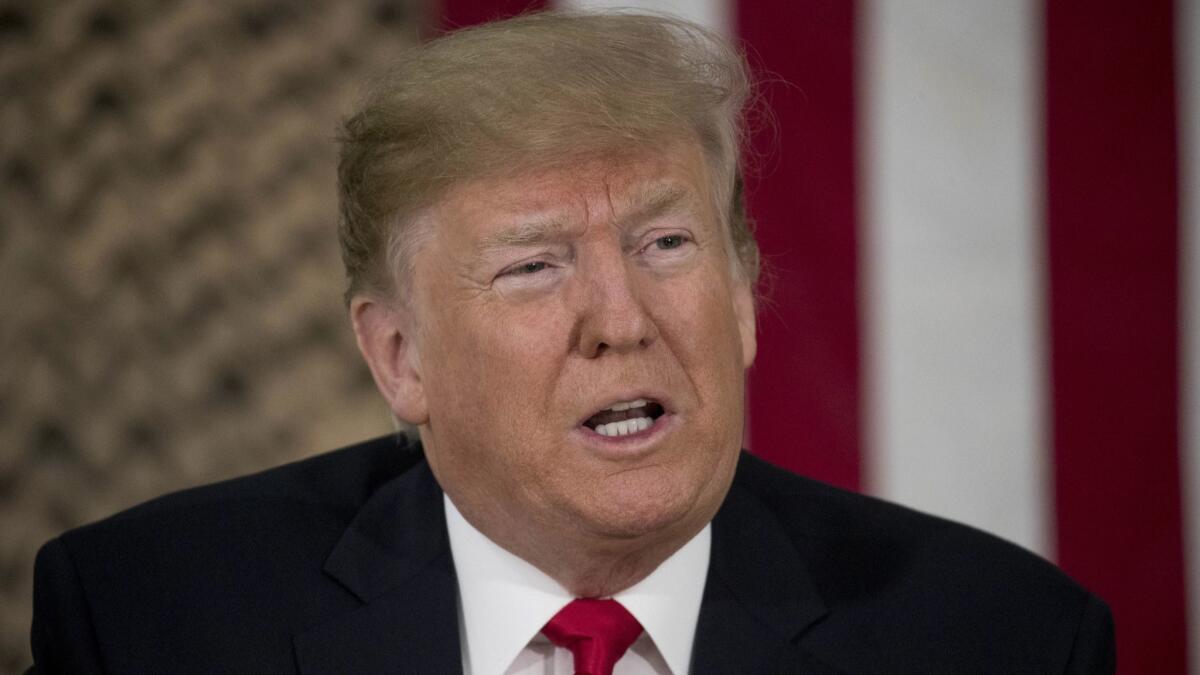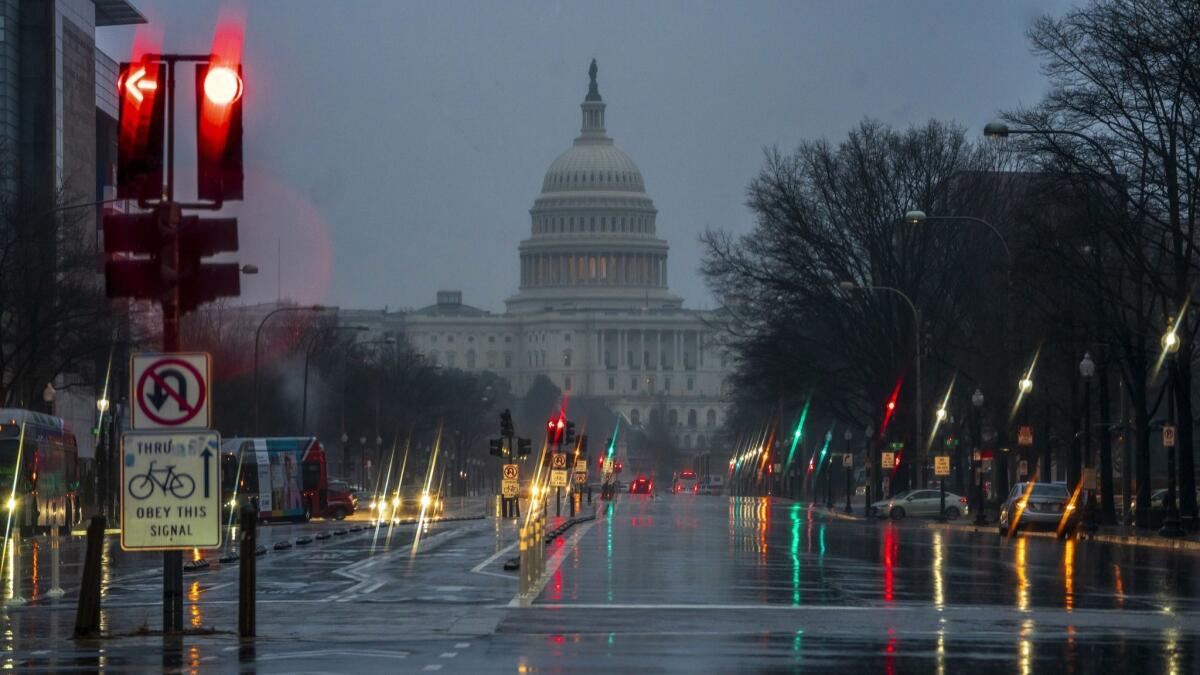Trump renews border-closing threat as shutdown standoff hardens

President Trump threatened to close the U.S.-Mexico border on Friday as he sought to shift blame for a partial federal government shutdown that appeared likely to stretch into 2019 over funding for the president’s proposed border wall.
“We will be forced to close the Southern Border entirely if the Obstructionist Democrats do not give us the money to finish the Wall & also change the ridiculous immigration laws that our Country is saddled with,” Trump said on Twitter.
Trump’s latest ultimatum came a day after House Republicans said they didn’t plan any votes this week and as the president sought to blame Democrats for a stalemate over funding for a wall that, according to polls, a majority of Americans don’t support. It echoed a threat he made in November to close the border if Mexican authorities couldn’t stop large groups of migrants from crossing into the U.S.
There was no sign of progress toward a plan to fund nine government departments that closed after funding ran out Dec. 21. The Senate and House held brief sessions Thursday afternoon, and neither chamber took any votes.
RELATED: Nearly one week in, here’s where things stand on the partial government shutdown »
Both Trump and Democratic leaders in Congress appear to be digging in their heels. Acting White House Chief of Staff Mick Mulvaney told Fox News that Trump had canceled his New Year’s plans at his golf resort in Florida and the two were in hourly contact about shutdown developments and the shooting of a police officer in California allegedly by an illegal migrant.
Democrats appear willing to wait until they take control of the House next week. “Democrats have offered Republicans three options to reopen government that all include funding for strong, sensible and effective border security — but not the president’s immoral, ineffective and expensive wall,” said Drew Hammill, a spokesman for Nancy Pelosi. Pelosi is expected to become speaker of the House.
Mulvaney said Trump was serious about shutting the U.S.-Mexico border. “I think he’s just trying to draw light to fact that this is a crazy discussion to be having,” Mulvaney said.
Details of any potential closing of the 1,954-mile border with Mexico aren’t yet clear. Mexico is America’s third-largest trading partner in goods with $557.6 billion in two-way trade during 2017, according to the Office of the U.S. Trade Representative. Trade in services accounted for another $58 billion.
Trump said in another tweet that the U.S. “looses soooo much money on Trade with Mexico under NAFTA, over 75 Billion Dollars a year (not including Drug Money which would be many times that amount), that I would consider closing the Southern Border a ‘profit making operation.’ ”
U.S. data show a $17.1-billion goods deficit with Canada in 2017, and a $71-billion goods deficit with Mexico. Both countries, however, reported substantially larger U.S. goods surpluses in the same relationship. In 2017, Canada reported a $97.7-billion surplus, and Mexico a $132.4-billion surplus.
More Americans blame Trump than they do Democrats for the shutdown by 47% to 33%, according to a Reuters/Ipsos poll released Thursday. Only 25% of those surveyed said they backed Trump shutting down the government over funding for the wall.
Senators have been told they’ll vote only once there’s a deal backed by Democrats and by Trump, who is demanding $5 billion for a wall at the southern border, his central campaign promise. Democrats call such spending wasteful and ineffective. The standoff produced a fresh round of finger-pointing late on Thursday.
White House Press Secretary Sarah Huckabee Sanders issued a statement outlining Trump’s demands that didn’t include the word “wall.” She said later there was no significance to that omission.
The White House is flexible on the composition of the border wall Trump has demanded, one official said, noting that the president has used a variety of terms to describe it in recent days including slats, fence and barrier.
Sanders complained that Democrats hadn’t responded to a compromise offer conveyed by Vice President Mike Pence late last week, and that the opposition party “decided to go home” while Trump stayed in Washington over Christmas to negotiate.

Underscoring the pressure Trump is facing from some in his own party, Rep. Louie Gohmert (R-Tex.) said Friday on Fox News that the shutdown should continue “until hell freezes over” if needed to secure funding for the barrier.
Senate Minority Leader Charles E. Schumer (D-N.Y.) rejected the offer from Pence, said his spokesman, Justin Goodman. The New York Democrat told Pence that Democrats won’t consider any offer without a public endorsement by Trump because the president has changed his position so often, said Goodman, who added that the two sides remained far apart.
Three options
House Democrats answered in kind.
Rep. Anthony Brown, a Democrat from Maryland, said the debate over border security needed to involve other issues — such as addressing the status of immigrants brought to the U.S. as children — as part of the negotiations.
“We’re holding federal government workers hostage, federal contractors hostage and the services that Americans expect from their federal government,” he said.
Volatility returned to U.S. markets, with stocks bouncing back from the lows of the day after flirting with a bear market amid higher interest rates and the political turmoil in Washington. U.S. stock futures extended gains and European shares rallied on Friday as traders struggled to make sense of wild price swings in the final sessions of the year.
Federal workers will begin to lose money starting with Friday’s paycheck, according to National Treasury Employees Union President Tony Reardon. That check will reflect work through last Saturday, the day the shutdown began. That means Saturday shift workers, including many in Customs and Border Protection, won’t see pay for that day in their checks.
All workers in the nine departments and dozens of agencies with funding lapses will miss their Jan. 11 paycheck if the shutdown continues, he said in an interview.
“I’ve had members come to me saying they are returning holiday and Christmas presents they bought because they are worried about paying rent,” Reardon said. He said he was disappointed that Congress wasn’t in session working to reopen the government.
In addition, thousands of U.S. home sales are being held up because the shutdown has halted the issuance of new flood insurance policies. The Federal Emergency Management Administration stopped issuing new policies under the National Flood Insurance Program. FEMA, which oversees disaster response, is part of the Department of Homeland Security.
House members have been told they’ll get 24 hours’ notice if they need to travel back to Washington to vote on any deal.
Jim McGovern, the incoming Democratic chairman of the House Rules Committee, said if there isn’t a resolution by Jan. 3 when the new Congress is sworn in, the Democratic majority will vote on a stopgap spending measure to reopen the government agencies. He said Democratic leaders are discussing whether funding would last until Feb. 8 like the Senate-passed bill, for the full fiscal year through September, or until some other date.
Republicans say they’re still waiting for Democrats to respond to an offer from the White House last Saturday. The administration said it would accept $2.1 billion for border barriers along with a $400 million flexible funds for immigration priorities. Democrats have dismissed the offer as hollow because Trump has said publicly he still wants $5 billion for a wall.
Congress is scheduled to return on Monday although no votes are scheduled, and lawmakers will be in recess on New Year’s Day. The current Congress ends at noon Jan. 3, when new members elected in November’s midterm election will take their oaths.
More to Read
Get the L.A. Times Politics newsletter
Deeply reported insights into legislation, politics and policy from Sacramento, Washington and beyond. In your inbox three times per week.
You may occasionally receive promotional content from the Los Angeles Times.









